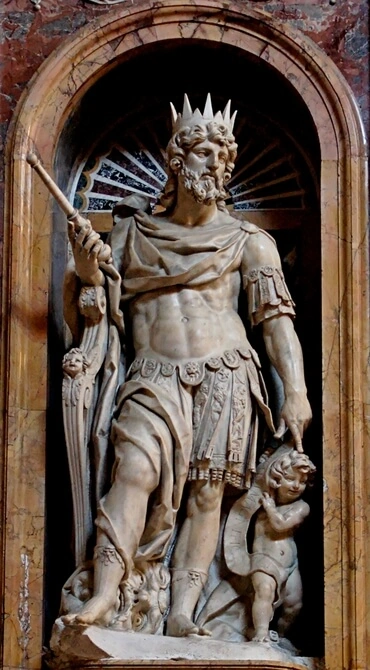1
Paul, a bondservant of Jesus Christ, called to be an Apostle, set apart to proclaim God's Good News,
2
which God had already promised through His Prophets in Holy Writ, concerning His Son,
3
who, as regards His human descent, belonged to the posterity of David,
4
but as regards the holiness of His Spirit was decisively proved by His Resurrection to be the Son of God--I mean concerning Jesus Christ our Lord,
5
through whom we have received grace and Apostleship in His service in order to win men to obedience to the faith, among all Gentile peoples,
6
among whom you also, called, as you have been, to belong to Jesus Christ, are numbered:
7
To all God's loved ones who are in Rome, called to be saints. May grace and peace be granted to you from God our Father and the Lord Jesus Christ.
8
First of all, I thank my God through Jesus Christ for what He has done for all of you; for the report of your faith is spreading through the whole world.
9
I call God to witness--to whom I render priestly and spiritual service by telling the Good News about His Son-- how unceasingly I make mention of you in His presence,
10
always in my prayers entreating that now, at length, if such be His will, the way may by some means be made clear for me to come to you.
11
For I am longing to see you, in order to convey to you some spiritual help, so that you may be strengthened;
12
in other words that while I am among you we may be mutually encouraged by one another's faith, yours and mine.
13
And I desire you to know, brethren, that I have many a time intended to come to you--though until now I have been disappointed--in order that among you also I might gather some fruit from my labours, as I have already done among the rest of the Gentile nations.
14
I am already under obligations alike to Greek-speaking races and to others, to cultured and to uncultured people:
15
so that for my part I am willing and eager to proclaim the Good News to you also who are in Rome.
16
For I am not ashamed of the Good News. It is God's power which is at work for the salvation of every one who believes--the Jew first, and then the Gentile.
17
For in the Good News a righteousness which comes from God is being revealed, depending on faith and tending to produce faith; as the Scripture has it, <"The righteous man shall live by faith.">
18
For God's anger is being revealed from Heaven against all impiety and against the iniquity of men who through iniquity suppress the truth. God is angry:
19
because what may be known about Him is plain to their inmost consciousness; for He Himself has made it plain to them.
20
For, from the very creation of the world, His invisible perfections--namely His eternal power and divine nature--have been rendered intelligible and clearly visible by His works, so that these men are without excuse.
21
For when they had come to know God, they did not give Him glory as God nor render Him thanks, but they became absorbed in useless discussions, and their senseless minds were darkened.
22
While boasting of their wisdom they became utter fools,
23
and, instead of worshipping the imperishable God, they worshipped images resembling perishable man or resembling birds or beasts or reptiles.
24
For this reason, in accordance with their own depraved cravings, God gave them up to uncleanness, allowing them to dishonour their bodies among themselves with impurity.
25
For they had bartered the reality of God for what is unreal, and had offered divine honours and religious service to created things, rather than to the Creator--He who is for ever blessed. Amen.
26
This then is the reason why God gave them up to vile passions. For not only did the women among them exchange the natural use of their bodies for one which is contrary to nature, but the men also,
27
in just the same way--neglecting that for which nature intends women--burned with passion towards one another, men practising shameful vice with men, and receiving in their own selves the reward which necessarily followed their misconduct.
28
And just as they had refused to continue to have a full knowledge of God, so it was to utterly worthless minds that God gave them up, for them to do things which should not be done.
29
Their hearts overflowed with all sorts of dishonesty, mischief, greed, malice. They were full of envy and murder, and were quarrelsome, crafty, and spiteful.
30
They were secret backbiters, open slanderers; hateful to God, insolent, haughty, boastful; inventors of new forms of sin, disobedient to parents, destitute of common sense,
31
faithless to their promises, without natural affection, without human pity.
32
In short, though knowing full well the sentence which God pronounces against actions such as theirs, as things which deserve death, they not only practise them, but even encourage and applaud others who do them.







